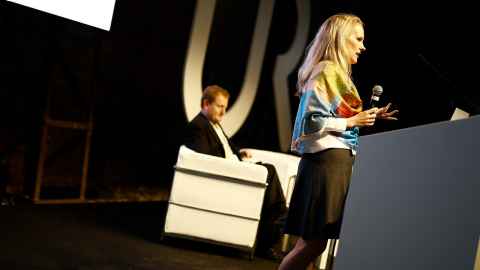Alanna Simpson

Earthquakes have a special significance for Alanna Simpson. Her grandparents were both survivors of the 1931 Napier earthquake and growing up hearing their harrowing stories and those of their families sparked an interest in the budding geologist.
But it was on her 12th birthday that the reality of earthquakes and their impact was to make a lasting impression on Alanna.
“The 1990 Dannevirke earthquake struck during my birthday party and seeing the terror on my 72 year old grandfather’s face as he ran from the house has stayed with me forever. It was very obvious to me he had suffered post-traumatic stress his whole life from barely escaping a collapsing school as a child.”
It was this combination of events that influenced Alanna to pursue a career in geoscience, working with governments and decision makers to help them build strong disaster risk management systems that ensure children and their families are safe when earthquakes, floods or any other natural disasters strike.
Graduating with a Bachelor of Science majoring in Geology in 2002 and gaining a Ph.D. in Geoscience at the University of Queensland, Alanna spent five years working for Geoscience Australia before joining the World Bank in 2012 where she now coordinates disaster risk management activities in Europe and Central Asia countries for the Bank.
“While there will always be earthquakes, cyclones, floods etc, there’s a lot we can do to prevent these hazards becoming disasters. I’m very proud of the fact that New Zealand learned a lot from the 1931 Napier earthquake and implemented strict building codes as well as establishing EQC giving its citizens much greater protection from disasters compared to many other countries.”
Alanna says the opportunity to work for the World Bank, a unique global institution focused on reducing poverty and supporting sustainable development, wasn’t originally part of her career plan but has allowed her to apply science to real challenges to support other countries to improve natural disasters protection in the future.
“Science provides an excellent educational foundation. I am so far from geology these days in my day-to-day work, but the principles of the scientific method, asking questions, approaches to learning etc has been critical. I have since had to learn about mathematical modelling of floods, physics of hurricanes, engineering weaknesses in different construction types, how to communicate with different audiences, public finance and policy and so on. This has been so much easier with my solid scientific background”.
Acknowledging the role the University played in fostering her interest in geology Alanna says she is proud of the role she played in breaking down one particular gender barrier.
“I gained an amazing opportunity to work as one of the first female engineering geologists working in the field in the Auckland region thanks to Professor Warwick Prebble. Prior to my appointment it was assumed women didn’t have the physical strength for the work. Warwick gave me the knowledge, tools and confidence to get Geotek Services to take a chance on me.
This first ‘professional’ job in my field gave me many intangible skills that I still use today and ultimately my time at University gave me a lifelong love of geology, rocks, natural hazards and a thirst for continuous learning which is one of the reasons I have ended up where I am today.”